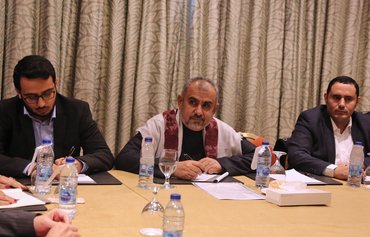While many hope the recent peace deal between Iran and Saudi Arabia will bring about an end to the war in Yemen, it remains to be seen whether Iran will commit itself to this process in a meaningful way, say analysts.
Many in Yemen say Iran will continue to arm and train the Houthis, noting that the China-brokered Iran-Saudi deal did not touch on this issue.
The deal "did not touch on actual details as much as it touched on maintaining the truce declared between the warring parties in Yemen", said Fadel al-Hindi of the King Abdulaziz University Centre for Social Research and Humanities.
The successful prisoner exchange that recently took place between the Yemeni government and the Houthis does not mean the deal itself will be successful, he told Al-Mashareq.
![Two former Saudi detainees who were held by the Houthis are seen here on April 15 during the prisoner exchange process between the two sides. [ICRC for the Gulf Co-operation Council Countries]](/cnmi_am/images/2023/04/21/41711-Saudi-prisoner-exchange-600_384.jpg)
Two former Saudi detainees who were held by the Houthis are seen here on April 15 during the prisoner exchange process between the two sides. [ICRC for the Gulf Co-operation Council Countries]
![View of the damage caused by a Houthi missile strike on the Saudi city of Jizan on March 2, 2021. [SPA]](/cnmi_am/images/2023/04/21/41713-Houthi-missile-Jizan-600_384.jpg)
View of the damage caused by a Houthi missile strike on the Saudi city of Jizan on March 2, 2021. [SPA]
He pointed out that this is not the first time that a prisoner exchange has taken place between the two sides since the conflict began -- but the overall situation has not changed, and the conflict is ongoing.
Iran does not respect international conventions, al-Hindi warned, and carries out attacks not only in Yemen but also in all the areas where the IRGC and its proxies are engaged in armed conflict.
He described the IRGC as "untrustworthy", pointing to its long history of violating bilateral and international agreements.
The prisoner exchange agreement "does not necessarily translate to the success of the peace deal or an actual move towards permanent peace", said Cairo-based Yemeni journalist Mona Mohammed.
Thousands of prisoners remain in Houthi prisons, and there are thousands of missing individuals who have not been accounted for, she told Al-Mashareq.
'Stop arming the Houthis'
Peace in Yemen will not happen while weapons remain in the hands of the Houthis, who have carried out mass executions and have directly targeted residential areas with missile strikes, Mohammed said.
She stressed that any lasting peace process in Yemen cannot succeed unless the arming of the Houthis stops and they hand over -- at a minimum -- heavy weapons, ballistic missiles and explosive drones obtained from the IRGC.
Additionally, Mohammed said, the Houthis must demonstrate they are willing to prosecute group members responsible for committing atrocities against civilians.
The IRGC continued its flow of weapons and missiles to the Houthis during the truce, which is a good indication of its true intentions and those of the Houthis, Saudi military expert Mansour al-Shehri told Al-Mashareq.
It seems as if the IRGC is being deceptive in the negotiation process by preserving the arsenal of missiles in its areas of control in the Middle East to use, or threaten to use, when needed, he said.
There was no talk in the deal about whether the weapons would be handed over or if their transfer to different countries in the region would stop, he said.
Critical to resolve oil issue
The Houthis have previously demonstrated they will use their arms to attack Yemeni, Saudi and Emirati oil infrastructure in order to further their own objectives, and may do so again, say observers.
On October 21 and November 9, the Houthis launched attacks on the oil export ports in Hadramaut and Shabwa, with the aim of disrupting oil exports.
In a February 27 report, the Middle East Institute (MEI) noted that even as the Houthis pursued talks with Saudi Arabia, the Iran-backed group was "ratcheting up the pressure" on the Yemeni government in various ways.
Shortly after they refused to renew the truce on October 2, the Houthis began to escalate against the government in an effort to exhaust its financial resources and provoke social unrest in government-held areas, MEI said.
The Houthis' goal was to compel the government to reconsider their current demands, "even if the government lacks the means to do so", MEI said.
The group had previously warned the government and oil companies that it would carry out attacks on critical government infrastructure unless it received a share of the oil revenues, among other conditions, it said.
The issue of the sharing of oil revenues among everyone in Yemen is a matter that must be thoroughly addressed, said al-Shehri, the Saudi military expert.
He asked how money could be allowed to flow to the Houthis while Iran continues to arm them, noting that if the Houthis continue to receive arms they will inevitably seek to expand their influence on the ground.
Additional oil revenue flowing to the Houthis also would relieve the financial pressure on Iran, he pointed out, which may enable the Islamic Republic to redirect revenue to its own military operations.

![Yemeni prisoners fly from Abha to Aden on April 17 after their release under the prisoner exchange agreement. [ICRC for the Gulf Co-operation Council Countries]](/cnmi_am/images/2023/04/21/41712-Yemen-prisoners-Abha-600_384.jpg)






